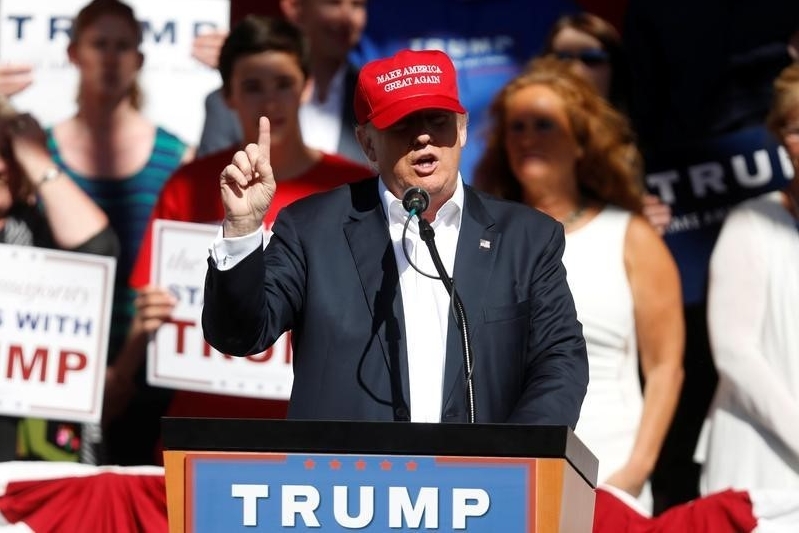
U.S. Republican presidential candidate Donald Trump said on Sunday he was open to raising taxes on the rich, backing off his prior proposal to reduce taxes on all Americans and breaking with one of his party's core policies dating back to the 1990s.
"I am willing to pay more, and you know what, the wealthy are willing to pay more," Trump told ABC's "This Week."
After effectively sealing the Republican nomination for the Nov. 8 presidential election last week, Trump has used speeches and interviews to offer more details on his policy positions.
The billionaire real estate tycoon has said he would like to see an increase in the minimum wage, although he told NBC's "Meet the Press" on Sunday he would prefer to see states take the lead on that front instead of the federal government.
"I don't know how people make it on $7.25 an hour," Trump said of the current federal minimum wage. "I would like to see an increase of some magnitude. But I'd rather leave it to the states. Let the states decide."
Trump's call for higher taxes on the wealthy is a break with Republican presidential nominees who have staunchly opposed tax hikes for almost three decades. Tax hikes have been anathema to many in the party since former President George H.W. Bush infuriated fellow Republicans by abandoning a pledge not to raise taxes and agreeing to an increase in a 1990 budget deal.
Democrats, including presidential front-runner Hillary Clinton, have pressed for increased taxes on the wealthiest Americans for years.
Trump released a tax proposal last September that included broad tax breaks for businesses and households. He proposed reducing the highest income tax rate to 25 percent from the current 39.6 percent rate.
Pressed on the contradiction between his latest comments on taxes and the September tax plan, Trump said he viewed his original proposal as "a concept" and that he expected it would be changed following negotiations with Congress.
"By the time it gets negotiated, it's going to be a different plan," Trump told ABC. He emphasized in separate interviews with ABC and NBC that his priorities were lowering taxes on the middle class and businesses.
"The middle class has to be protected," Trump told NBC. The rich are "probably going to end up paying more," he said.
The Clinton campaign said Trump was trying to pander to voters beyond those who supported him in the Republican nominating contests and that he had no intention of raising the taxes of wealthy people.
"Don't believe Donald Trump's weak attempts at a general election 'makeover' for even a second," Christina Reynolds, a Clinton campaign spokeswoman, said in a statement. "Trump's economic plans take direct aim at working Americans - his proposal to cut trillions in taxes for the top one percent would almost certainly come at the expense of working- and middle-class families."
When asked on NBC whether he would release his own tax returns before the election, Trump said once again that it depended on the completion of an audit.
"Sure. If the auditors finish. I'll do it as fast as the auditors finish," he said.
DEEP DIVIDE
Republicans remain deeply divided over Trump's candidacy, although he has pledged to try to unite the party ahead of its convention in July. Prominent party leaders such as Paul Ryan, the top elected U.S. Republican, have distanced themselves from Trump over his proposal to temporarily ban Muslims from entering the United States.
Ryan, who has been a leading voice for the Republican Party on budget issues for years and is the House of Representatives speaker, has proposed a series of budgets that would cut taxes across the board.
Trump has also called for new tariffs on Chinese and Mexican imports to the United States, a position at odds with views on trade held by Ryan and many other pro-business Republicans.
Ryan, who will preside over the July 18-21 convention in Cleveland where the party will formally nominate its presidential candidate, said last week he hoped to eventually support Trump. But he added: "I'm just not there right now."
Republican U.S. Senator Jeff Flake of Arizona also is undecided about Trump. Flake said he wanted to see Trump revise some of his positions, including the proposed ban on Muslims entering the United States.
"He's got to soften his position there," Flake said.
Underscoring the party's divisions, Sarah Palin, the 2008 Republican vice presidential candidate and a Trump supporter, criticized Ryan for failing to endorse Trump. The conservative populist firebrand said she would work to defeat Ryan in his Aug. 9 primary race against a conservative businessman.
Clinton said she hoped to take advantage of Republican reticence over Trump to draw the support of party defectors.
"I am asking people to come join this campaign," the former secretary of state told CBS. "And I've had a lot of outreach from Republicans in the last days who say that they are interested in talking about that."






